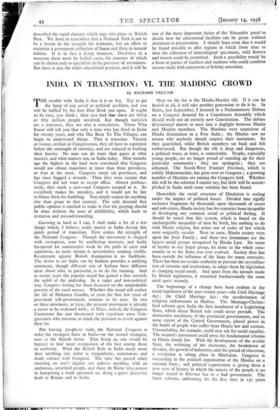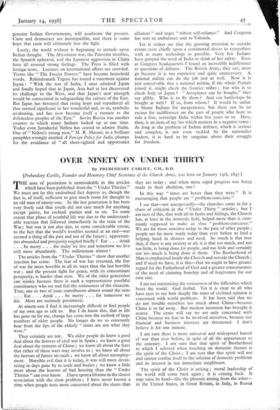INDIA IN TRANSITION: VI. THE MADDING CROWD
By RICHARD FREUND
THE trouble with India is that it is so big. Try to get the hang of any social or political problem, and you will be baffled by the first Blue Book you open. It ought to be easy, you think ; then you find that there are thirty or fifty million people involved. But though statistics are a nuisance, they are also a consolation. Those Who Know will tell you that only a man who has lived in India for twenty years, and who Has Been To The Villages, can begin to understand things. That is nonsense. Viceroy or visitor, civilian or Congressman, they all have to capitulate before the onslaught of statistics, and are reduced to backing their fancies. No man can do more than guess at what matters, and what matters not, in India today. Nine months ago the highest in the land were convinced that Congress would not obtain majorities in more than three provinces, or four at the most. Congress swept six provinces, and has since bagged a seventh. Then they were certain that Congress did not want to accept office. Almost perfunc- torily, they made a cast—and Congress jumped to it. So everybody makes his mistakes, and it would not be fair to blame them for fumbling. You simply cannot do anything else than grope in that country. The only demand that public opinion is entitled to make is that the groping should be done without the pose of infallibility, which leads to irritation and misunderstanding.
Guessing as hard as I can, I shall make a list of a few things which, I believe, really matter in India during this giddy period of transition. First comes the strength of the National Congress. Though the movement is clogged with corruption, torn by conflicting interests, and badly hampered for constructive work by the pulls of caste and capitalism, its main stream is nevertheless running swiftly. Resentment against British domination is its backbone. The desire to see India run by Indians provides a unifying sentiment, though different sets of Indians have different ideas about who, in particular, is to do the running. And in recent years the popular mood has gained a bias towards the uplift of the underdog. In a vague and non-political way, Congress feeling has been focussed on the unspeakable poverty of the rural masses. Whether this trend will outlast the life of Mahatma Gandhi, or even the first few years of provincial self-government, remains to be seen. In two or three provinces, at least, the peasant movement is already a factor to be reckoned with ; in Bihar, indeed, the Congress Committee has just threatened with expulsion some Con- gressmen who presume to teach the peasants to revolt against their lot.
But leaving prophecy lside, the National Congress is today the strongest force in India—or the second strongest, next to the British Army. That being so, one would be happier to find more recognition of the fact among those in authority. What the British Rule in India needs more than anything else today is sympathetic, continuous, and frank contact with Congress. The time has passed when standing on one's dignity can achieve anything with an ambitious, unsettled people, and those At Home who persist in hampering a frank approach are doing a grave disservice both to Britain and to India. Next on the list is the Hindu-Muslim rift. If it can be healed at all, it will take another generation to do it in. In Simla, last September, I listened to a Parliamentary Debate on a Congress demand for a Constituent Assembly which should work out an entirely new Constitution. The debate deteriorated almost at once into a dogfight between Hindu and Muslim members. The Muslims were suspicious of Hindu domination in a Free India ; the Hindus saw no reason why anybody should suspect their intentions. So they quarrelled, while British members sat back and felt embarrassed. But though the rift is deep and dangerous, a political truce, at least, is conceivable. People, especially young people, are no longer proud of standing up for their particular community ; they are apologetic ; they are ashamed. The North-West Frontier Province, which is solidly Mahommedan, has gone over to Congress ; a growing number of Muslims are joining the Congress fold. Whether this will be the solution I cannot say, but little will be accom- plished in India until some solution has been found.
Meanwhile the social structure of Hinduism is reeling under the impact of political forces. Divided into rigidly exclusive fragments by thousands upon thousands of castes and sub-castes, Hindu society has for centuries been incapable of developing any common social or political feeling. It should be noted that this system, which is based on the unchangeable inequality of men by birth, has nothing to do with Hindu religion, but arises out of codes of law which were originally secular. Next to caste, Hindu society rests upon the Joint Family ; and these two formations are the largest social groups recognised by Hindu Law. No sense of loyalty to any larger group, let alone to the whole com- munity or to the State, was ever evolved. Society thus has been outside the influence of the State for many centuries. There has been no secular authority to prevent the crystallisa- tion of customs and institutions, to adapt them by legislation to changing social needs. And apart from the inroads made by British legislation, it remained fundamentally the same until quite recently.
The beginnings of a change have been evident in the social legislation of the past twenty years—the Civil Marriage Act ; the Child Marriage Act ; the secularisation of religious endowments in Madras. The Montagu-Chelms- ford reforms gave India the first instalment of a Legislating State, which direct British rule could never provide. The democratic machinery of the provincial governments, and to some extent of the Central Government, placed power in the hands of people who suffer from Hindu law and custom. Untouchables, for example, could now ask for social equality. The women's movement could press for fundamental reforms of Hindu family law. With the development of the seculir State, the widening of the electorate, the breakdown of distance, the growth of industries, and the spread of education, a revolution is taking place in Hinduism. Congress is succeeding in the political organisation of the Hindus on a national basis ; and political organisation is giving them a new view of history in which the misery of the people is no longer traced to Kharma but to a bad government. The latest reforms, enthroning for the first time in 15c years genuine Indian Governments, will accelerate the process. Caste and democracy are incompatible, and there is some hope that caste will ultimately lose the fight.
Lastly, the world without is beginning to intrude upon Indian thought. The Abyssinian war, the Palestine troubles, the Spanish upheaval, and the Japanese aggression in China have all aroused strong feelings. The Press is filled with foreign news. Lectures on international affairs are crowded. Terms like " The Fascist Powers " have become household words. Rabindranath Tagore has issued a statement against Japan : " With the rest of India, I once admired Japan and fondly hoped that in Japan, Asia had at last discovered its challenge to the West, and that Japan's new strength would be consecrated in safeguarding the culture of the East. But Japan has betrayed that rising hope and repudiated all that seemed.significant in her wonderful and, to us, symbolic awakening, and has now become itself a menace to the defenceless peoples of the East." Soviet Russia was another country to which many Indians looked up at one time. Today even Jawaharlal Nehru has ceased to admire Stalin. One of " Nehru's young men," M. R. Masani, in a brilliant pamphlet wrongly entitled A Foreign Policy for India, plumps for the avoidance of " all short-sighted and opportunist alliances " and urges " robust self-reliance." And Congress has sent an ambulance unit to Valencia.
Yet it strikes me that the growing attention to outside events rests chiefly upon a sentimental desire to sympathise with as many underdogs as possible. Very few Indians have grasped the need of India to think of her safety. Even at Congress headquarters I found an incredible indifference to questions of defence. The British Army, they say, must go because it is too expensive and quite unnecessary. A national militia can do the job just as well. Now it is just conceivable that a national militia, if the whole Punjab joined it, might check the frontier tribes ; but who is to check Italy or Japan ? " Aeroplanes can be bought," they say glibly. Who is to fly them ? And can battleships be bought as well ? If so, from whom ? It would be unfair to blame Indians for inexperience, but there can be no excuse for indifference on the part of people who hope to rule a free, sovereign Ihdia within five years or so. Here, then, is an item of my list which matters in a negative sense : As long as the problem of Indian defence, which is serious and complex, is not even tackled by the nationalist leaders, it is hard to be sanguine about their struggle for freedom.







































 Previous page
Previous page